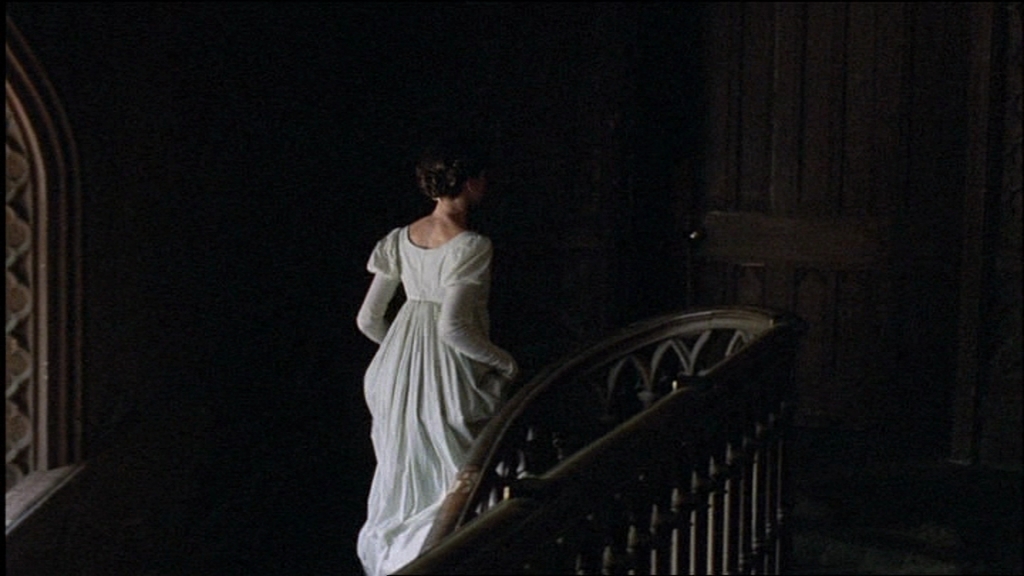
Friday
Knock on wood but Sewanee’s Covid program appears to be working. There is regular testing for students, faculty and staff, and the few students who have tested positive have been quarantined, along with everyone they have come in contact with. Various other measures are in place, and because the college and the town are one and the same (the entire town sits on college land), virtually everyone is following the Covid protocols. The very few people without masks I have seen are not connected with the college.
One of Sewanee’s compliance mechanisms reminds me of a strange passage in Northanger Abbey that has long startled Austen fans. The mechanism is a special app that allows students to report on their fellow students if they see them violating Covid rules. The passage is Henry Tilney rebuking Catherine after discovering that she, on the basis of her gothic novel obsession, suspects his father of having imprisoned or even killed his mother:
If I understand you rightly, you had formed a surmise of such horror as I have hardly words to—Dear Miss Morland, consider the dreadful nature of the suspicions you have entertained. What have you been judging from? Remember the country and the age in which we live. Remember that we are English, that we are Christians. Consult your own understanding, your own sense of the probable, your own observation of what is passing around you. Does our education prepare us for such atrocities? Do our laws connive at them? Could they be perpetrated without being known, in a country like this, where social and literary intercourse is on such a footing, where every man is surrounded by a neighborhood of voluntary spies, and where roads and newspapers lay everything open? Dearest Miss Morland, what ideas have you been admitting?
In one respect, the rebuke seems unobjectionable. Use your common sense, he tells her, reminding her that nothing in English culture, education, or legal history makes such behavior likely. Catherine, although thoroughly mortified, nevertheless draws the proper lesson from Tilney’s words and resolves on a more balanced view of human behavior in the future. While people in other countries may be prone to extremes,
among the English, she believed, in their hearts and habits, there was a general though unequal mixture of good and bad. Upon this conviction, she would not be surprised if even in Henry and Eleanor Tilney, some slight imperfection might hereafter appear; and upon this conviction she need not fear to acknowledge some actual specks in the character of their father, who, though cleared from the grossly injurious suspicions which she must ever blush to have entertained, she did believe, upon serious consideration, to be not perfectly amiable.
The discordant phrase is “voluntary spies,” which has more bite than one would anticipate in a discourse on English reasonableness. Being aware of what your neighbors are doing takes on a sinister air, a threat designed to ensure civilized behavior. The hint of menace is associated with the very gothic sensibility that Tilney is attacking.
Such “spying” is occurring in Sewanee as well. I’ve heard of at least one roommate turning in another for dropping her boyfriend off at an airport (she didn’t get out of the car but wasn’t even supposed to leave the campus) and of two students being sent home because they were seen on an elevator surveillance camera carrying MacDonald’s carryout. Such spying—or even just the threat of it—may be necessary as millions of dollars in college fees are at stake, not to mention the health and even the lives of those with whom the students come into contact. Still, as in Tilney’s speech, the idea of ratting out one’s fellows makes one uneasy.
Perhaps Tilney (and Austen herself?) feels suffocated by his closed society and momentarily kicks out against it. After all, versions of the spying he mentions occur in all of Austen’s novels. (How else do the Bennets know that Bingley is worth 5000 a year?) It doesn’t help that sometimes the spies get their information wrong: Tilney’s father at first hears from sources that Catherine’s family is wealthier than they actually are and then poorer, leading him to first welcome her to his home and then boot her out. In his rebuke, Tilney essentially tells Catherine that his father didn’t kill his mother because the spy network would have reported it if he had.
Framing social gossip as spying, then, links General Tilney to the gothic novel after all, even if he isn’t a murderer. Spying plays to the paranoia that (according to scholar Tania Modleski) is at the heart of the genre. She argues that dictatorial patriarchs like the general drove women to the genre, who saw themselves in the persecuted and imprisoned heroines. While gothics may mislead Catherine in one respect, symbolically they give her a fairly good picture of how the “not perfectly amiable” general made his wife’s life a living hell.
If a fear of neighborhood spies keeps General Tilney from actually killing his wife, however, then there’s something to be said for spying. Similarly, if it keeps students from engaging in dangerous behavior so that the school remains open, then who can argue? Nevertheless, one understands Tilney’s underlying exasperation with the practice. Many of Sewanee’s students undoubtedly feel the same.